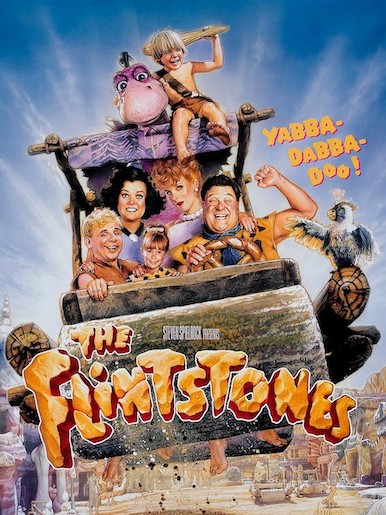Friday, May 27, 1994
SO YOU LIKE THE Flintstones.
You say that, cranky critics notwithstanding, you're going to see it [the 1994 movie], and you're going to have a gay old time.
OK. For an encore, may we suggest a do-it-yourself live-action cartoon festival?
For almost as long as there have been movies, there have been live-action versions of popular comic strips, comic books and cartoons. Though you may have trouble finding any Blondie features — 28 were made between 1938 and 1950 — video shops do stock the more recent examples.
Since 1978, the year the special effects wizards made us believe a man could fly, major movie characters have emerged from the cartoon inkwells at a great rate.
Hollywood's current interest took flight with Superman, The Movie, director Richard (Maverick) Donner's feature based on the comic book character from the 1930s. Everything came together in this tale of Kal-El, a strange visitor from another planet whose powers and abilities included a savvy sense of humour.
Actor Christopher Reeve has since played the Man of Steel in three less impressive sequels — Superman II (1980) and III, directed by Richard Lester; and Superman IV, directed by Canadian Sidney J. Furie. Helen Slater played his cousin Supergirl in a 1984 feature.
Moviemakers' love affair with comics soured briefly in 1986. Though based on a brilliant mid-1970s comic book, Howard the Duck gave off a fowl stench at the box office. Directed by George Lucas associate Willard Huyck, the Duck movie mistook spectacular special effects for story-telling, and misplaced the timely satirical humour of its source material.
Falling between the two extremes was an act of cinematic daring from director Robert (Nashville) Altman. Though a failure financially, his Popeye (1980) is an underrated classic. A musical fantasy, it stars Robin (Mrs. Doubtfire) Williams in the title role. He's perfect in his first major make-up performance, and the comedy is a screwball delight.
Other live-action cartoons are:
● Addams Family (1991); Addams Family Values (1993). Denatured by 1960s television, the macabre Charles Addams vision reaches the big screen as smug suburban eccentricity.
● Annie (1982); Dennis the Menace (1993). One is a sappy adaptation of a sappy Broadway musical based on the Depression-era adventures of Little Orphan Annie. The other visits an unpleasant, chillingly mean-spirited suburbia.
● Batman (1989); Batman Returns (1992). Tim Burton's darkly moody, other-worldly evocations of the Dark Knight's tale overcome the off-type casting of Michael Keaton in the title role.
● Buck Rogers in the 25th Century (1979); Flash Gordon (1980). The emphasis is on the comic in these broad, deliberately silly versions of the science-fictional adventure strips.
● Dick Tracy (1990). Warren Beatty directed himself in a self-indulgent tale of cartoon crime-fighting, a picture as prettily empty-headed as its co-star, Madonna.
● Swamp Thing (1982); Return of Swamp Thing (1989). An adult comic book gets the kiddie movie treatment. The results are surprisingly good-natured and entertainingly inoffensive.
The above is a restored version of a Province feature by Michael Walsh originally published in 1994. For additional information on this archived material, please visit my FAQ.
Afterword: Times change. When I was a comic-book-reading kid, movies were either original screen concepts, or based on stories from books or mass-circulation magazines. As noted in the above feature, newspaper comic strips only provided source material for B-movie series produced by the so-called “Poverty Row” studios from the 1930s into the early 1950s. Hollywood didn’t become serious about comics until the 1970s, after publisher DC and production company Warner Brothers found themselves units of the entertainment conglomerate Warner Communications.
Today, well, books have been written attempting to explain how such a seismic shift in American popular culture came about. My own favourite is Shawna Kidman’s 2019 Comic Books Incorporated: How the Business of Comics Became the Business of Hollywood. A political economist and media scholar, she retells the now-familiar story from the perspective of corporate infrastructure. In doing so, she makes an important new contribution to our understanding of both the art and influence of a previously under-appreciated medium.
For the record, today’s Free Comic Book Day coincides with yesterday’s general release of Doctor Strange in the Multiverse of Madness, director Sam (Darkman) Raimi’s $200-million sequel to 2016’s Doctor Strange. Not being a particular fan of Raimi or the MCU, I’d prefer a visit to my local independent comic shop. There, I’m guaranteed an encounter with a multiverse of creativity not based on the same old superhero stereotypes.
